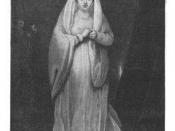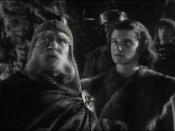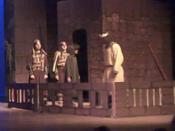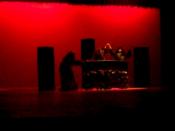People and ideas can greatly affect the outcome of a person's life, determining whether the outcome will be successful or disastrous. Decisions and actions can also influence outcome. This is the case in Macbeth. Many factors cause the ruin of Macbeth and for that reason, all the blame for his downfall cannot be placed on Macbeth himself, despite the fact that he is the one that commits or has people commit the murders which lead to his downfall. Lady Macbeth's encouragement and convincing lead Macbeth to take the first step towards his destruction. The witches and their prophecies are equally accountable, since the witches reveal their predictions to Macbeth, giving him a glimpse into his future. This glimpse represents the beginning of the end of his life. Macbeth and Lady Macbeth, as well as the witches and their prophecies are all responsible for Macbeth's downfall.
The witches are responsible for the downfall of Macbeth because they are the ones which reveal the prophecies to Macbeth.
1. Witch. All hail, Macbeth! Hail to thee, Thane of Glamis! 2. Witch. All hail, Macbeth! Hail to thee, Thane of Cawdor! 3. Witch. All hail, Macbeth, that shalt be King here- after!1 If Macbeth had never encountered the witches, they would never have revealed the prophecies to him. He would have become the Thane of Cawdor, and he would never have even considered the idea of making himself the King of Scotland. It would have remained a fantasy that would probably never have come true in the way that it did.
The witches are the ones who allow Macbeth to discover his future, and by doing this, they give him the opportunity to consider making the prophecy come true. The only way to do this is to murder Duncan, the present King of Scotland. At first he is reluctant to do so. Lady Macbeth points out that he has the perfect opportunity, since the King will be spending the night at their castle, Inverness. Macbeth's conscience, however, is holding him back from committing the murder.
He's here in double trust: First, as I am his kinsman and his subject, Strong both against the deed; then as his host, Who should against his murderer shut the door.
Not bear the knife myself. (I. Vii. ll 12-16) He realizes that he has a responsibility to Duncan to protect him from a murderer and not to actually murder Duncan himself. Macbeth is also supposed to be loyal to the king, especially since he is a relative and a subject. When Macbeth does carry out the murder, even though he is influenced, he becomes responsible for his own downfall.
Lady Macbeth, the other responsible party, knows her husband and realizes that he will not murder Duncan. She knows he has values, morals and a conscience that will prevent him from even considering the idea of murder.
Glamis thou art, and Cawdor, and shalt be What thou art promised. Yet I do fear thy nature.
It is too full o' the milk of human kindness To catch the nearest way. (I. v. ll 14-17) Therefore, she takes it upon herself to convince Macbeth and to aid him in the actual crime. She first has to make sure that she can eliminate any emotions that will get in her way. She also has to rid herself of her conscience.
Come you spirits That tend on mortal thoughts, unsex me here, And fill me from the crown to the toe, top-full Of direst cruelty! Make thick my blood; Stop up the access and passage to remorse, That no compunctious visitings of nature Shake my fell purpose nor keep peace between The effect and it!⦠Come, thick night, And pall thee in the dunnest smoke of hell, That my keen knife see not the wound it makes, Nor heaven peep through the blanket of the dark To cry "Hold, hold!" (I, v, ll 44-58) The only way to do this is to turn to the supernatural, the evil, and ask them to help her carry out her tasks. With the help of the supernatural, Lady Macbeth sets out to convince her husband to kill the king.
The feelings of reluctance that Macbeth was plagued with eventually leave him. Lady Macbeth constantly tries to convince her husband to kill Duncan, or at least to let her help him do so. Her words of convincing do not help very much, and she is therefore forced to use insults and to attack his manhood.
When you durst do it, then you were a man; And, to be more than what you were, you would Be so much more the man. Nor time nor place Did then adhere, and yet you would make both: They have made themselves, and their fitness now Does unmake you. (I. vii. ll 55-60) The insults work, and Macbeth finally gives in to his wife. He listens to her plan, and agrees to follow it.
I am settled, and bend up Each corporal agent to this terrible feat.
Away, and mock the time with fairest show: False face must hide what the false heart doth know.
(I. vii. ll 90-93) He will commit the murder and will conceal that fact from everyone else. Had it not been for Lady Macbeth's persuasion, Macbeth would never have killed Duncan. She was the driving force that forced him to commit the crime.
Later, when Macbeth is waiting to kill Duncan, he sees a dagger. He realizes it is not real, but just an image. However, he believes it is beckoning him to kill Duncan.
Is this a dagger which I see before me, The handle toward my hand? Come let me clutch thee! ⦠Thou marshal'st me the way that I was going, And such an instrument I was to use.
(II. i. ll 42-52) The dagger gives him the final push that he needs to carry out the crime. He believes that it is leading him towards Duncan. He then hears a bell, which he believes represents Duncan's death knell. He knows that the murder will be carried out - Duncan will be killed.
Despite the reluctance, remorse, and shock he initially felt, regarding Duncan's murder, Macbeth continues to kill. Once Duncan was eliminated, Macbeth's conscience disappeared, allowing Macbeth to continue to murder people, whether the murders serve a purpose or not. Having fulfilled the prophecy and acquiring the throne, Macbeth wants to ensure that the thron reamins his. He goes to the witches, whom he now considers his allies, to find out what the future holds for him.
I will to-morrow (And betimes I will) to the Weird Sisters: More shall they speak, for now I am bent to know By the worst means, the worst. (III. iv. ll 164-167) Macbeth now completely trusts the witches and the thought that they might be deceiving him, is no longer a problem for him. He wants to discover everything about his future, so that he can protect his new position, and eliminate all potential enemies who might try to strip him of it.
The witches know that Macbeth will return to them and they know that they now control him completely. Hecate, the highest - ranking witch, was not included in the original plans of destroying Macbeth, and when she hears of the plans, she decides that will set Macbeth up.
How did you dare To trade and traffic with Macbeth In riddles and affairs of death;...
And that, distill'd by magic sleights, Shall raise such artificial sprites As by the strength of their illusion Shall draw him on to his confusion.
He shall spurn fate, scorn death, and bear His hopes 'bove wisdom, grace, and fear; And you all know security Is mortals' chiefest enemy. (III. v. ll 3-5...26-33) The witches have no doubt that they have lured Macbeth to their side. They gave him the prophecies to attract him, and now they have caught him. He will do anything to keep his position as King, no matter how evil or cruel. He will also believe anything that they tell him. They show him fragments of his future and give him a false sense of security, which they plan to lead to his downfall.
To summarize, Macbeth, alone, is not entirely responsible for his downfall. He permits himself to be influenced by evil, present in the witches and in his wife. Lady Macbeth's persuasion forces Macbeth into giving the murder a great deal of consideration, instead of leaving it as a thought that lurks in the back of his mind. Her convincing and challenging of his "manliness" by accusing him of cowardice are the deciding factors causing Macbeth to commit the murder of Duncan. The involvement of the witches is the cause of the entire situation. They are the ones who reveal the prophecies to Macbeth. Without these revelations, Macbeth is a person, just like any other, not knowing what the future holds, oblivious to the fact that he will one day become the king. The fact that Macbeth knows that he is destined to become king, and that Lady Macbeth convinces him to commit the first murder, mark the beginning of Macbeth's journey on the path of evil stopping along the way, to carry out more murders devoid of feeling, and to isolate himself from the people he loves and the people of his country, the end of which, is his downfall.





